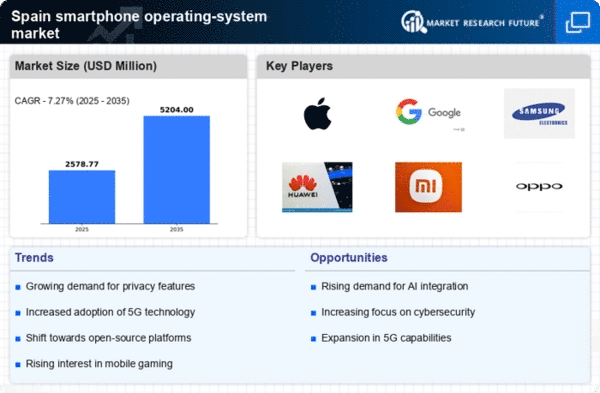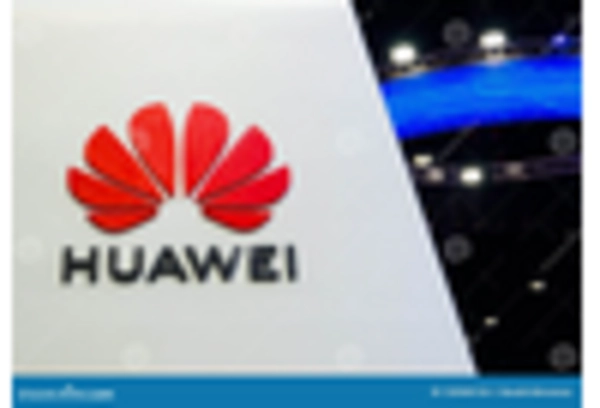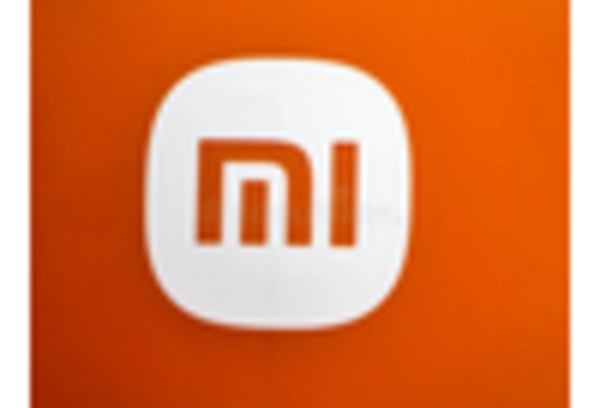Increased Focus on Sustainability
The smartphone operating-system market in Spain is witnessing an increased focus on sustainability, driven by consumer awareness and regulatory pressures. As environmental concerns gain prominence, users are more inclined to choose devices and operating systems that prioritize eco-friendly practices. In 2025, it is projected that around 40% of consumers in Spain will consider sustainability as a key factor in their purchasing decisions. This trend encourages operating system developers to adopt sustainable practices, such as optimizing energy consumption and supporting recycling initiatives. Consequently, the smartphone operating-system market must adapt to these evolving consumer values, fostering a more sustainable approach to technology.
Advancements in Mobile Connectivity
The smartphone operating-system market in Spain is significantly influenced by advancements in mobile connectivity technologies. The rollout of 5G networks across the country enhances the capabilities of smartphones, enabling faster data transfer and improved user experiences. As of November 2025, approximately 60% of mobile users in Spain are expected to utilize 5G services, which may lead to increased demand for operating systems that can fully leverage these capabilities. This shift necessitates that operating system developers prioritize the integration of features that optimize performance in high-speed environments, thereby ensuring that users can take full advantage of the enhanced connectivity offered by 5G networks.
Growing Demand for Mobile Applications
The smartphone operating-system market in Spain experienced a notable surge in demand for mobile applications. As consumers increasingly rely on smartphones for various tasks, the need for diverse and innovative applications becomes paramount. In 2025, the number of mobile app downloads in Spain was projected to reach approximately 3 billion, reflecting a growth of around 15% from the previous year. This trend compels operating system developers to enhance their platforms, ensuring compatibility and performance for a wide array of applications. Consequently, the smartphone operating-system market must adapt to these evolving consumer preferences, fostering an environment where developers can create and optimize applications that cater to the needs of Spanish users.
Integration of Artificial Intelligence
The integration of artificial intelligence (AI) technologies into smartphone operating systems is emerging as a pivotal driver in the market. In Spain, AI capabilities enhance functionalities such as voice recognition, predictive text, and personalized recommendations, significantly improving user engagement. By November 2025, it is estimated that AI-driven features will be present in over 80% of new smartphone models, reflecting a growing trend towards smarter devices. This shift compels operating system developers to incorporate AI functionalities, thereby enhancing the overall user experience and positioning their platforms competitively within the smartphone operating-system market.
Rising Consumer Expectations for User Experience
In the smartphone operating-system market, rising consumer expectations for user experience play a crucial role in shaping development strategies. Spanish consumers increasingly seek intuitive interfaces, seamless navigation, and personalized features. As a result, operating system developers are compelled to invest in research and development to create platforms that meet these heightened expectations. In 2025, surveys indicated that over 70% of smartphone users in Spain prioritized user experience when selecting devices, underscoring the importance of this driver. Consequently, the smartphone operating-system market must focus on continuous improvement and innovation to retain user loyalty and attract new customers.
















